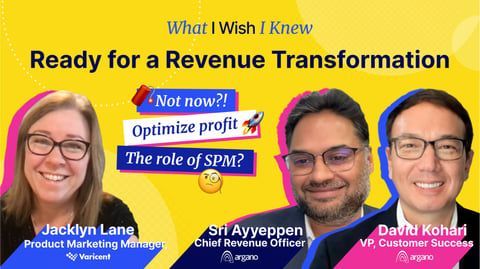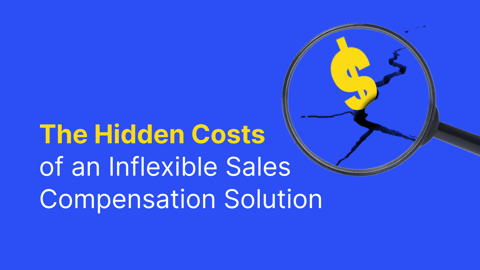What is Incentive Compensation Management?
Before we build the story and bust some myths about how to implement Incentive Compensation Management (ICM) programs, allow us to lay the foundation by briefly outlining what one is, what it isn’t, and why you need a good one. Here’s a clue: it’s not the same thing as a bonus.
Incentive compensation is usually devised and managed by the HR department and awarded to an employee in addition to their base salary for meeting and exceeding performance and productivity. It’s often used as a recruiting tool, attracting talented candidates, and can also contribute to that all-important Net Promoter Score (NPS) for a business when being scrutinized and marked against other companies. Put simply, an ICM is ideally a solid scheme with specific goals.
A bonus tends to fluctuate in value and regularity and can often be an unexpected additional slice of the rewards pie. That could be due to great results for the wider team or business or calculated due to an individual bringing in a new client or source of revenue. We often associate bonuses with those numerous tales of hedge fund managers and investment bankers who are reported to sweep up more in a bonus than many people make in ten years. An ICM program, on the other hand, is much more rooted in the achievable and when executed correctly, gives everyone a reasonable target to aim for.
Drilling this down, a bonus is usually given based on historical achievement, whereas an ICM program is always forward-looking and built on future goals.
Why is an ICM Program Important to Sales Teams?
In the past, unnecessarily complicated compensation structures and overlaps with disparate bonuses could prove confusing – especially for those dedicated souls working in sales, out in the field where earning commission is a fundamental cornerstone of the job.
Understanding the metrics involved remains the strongest form of ongoing connection and personal driver when a sales executive is plowing through the sales cycle. Giving structure and context to monetary goals and milestones allows these employees to push themselves and work within the limits of team competitiveness while keeping their eyes on the prize.
Let us repeat (as it can’t be overstated), anything less than a transparent ICM structure, for example, clauses that only apply to certain people or deals that seem to have different values depending on how they’re calculated, will result in great people potentially deserting your company.
Therefore, we can thank the gods of sales performance management (SPM) software for giving us tools and platforms that make rolling out an achievable, integrated, and fair ICM program so much more straightforward and so much more popular with sales teams.
Your ICM Program as Part of the Recruitment and Onboarding Process
While the concept of an attractive ICM program — often presented during recruitment interviews and onboarding as a reason to join the business — might have seemed both clear and enticing, in its initial presentation, how this is operationally managed in “real life” can sometimes bear little relation to that initial concept. Once someone is “bedded in”, how soon is it before they realize that the ICM program is inaccessible, prone to error, or at worst, rooted in fantasy?
That’s the bad news scenario out of the way. Flipping that on its head, a well-presented and honest ICM program could be the very thing that attracts your next sales superstar. If, at all stages, it’s watertight and if anything is capable of expansion, rather than unwanted “leakage”, then you’re more likely to employ a loyal and satisfied member of the team.
Returning briefly to the aforementioned NPS or even Glassdoor company reviews, one sure-fire way of making sure those comments and scores stay buoyant and positive is by investing in an ICM program that keeps its promises, and by backing that up with the software that supports this.
What a Good ICM Program Platform Looks Like
The content and scope of this software is the real measure of ICM program rigor and success. Varicent’s most recent ICM program product release brings together all the elements needed to support and grow your business’ compensation/commission plan in a simplified manner. Our platform offers the essential tools for managers to deliver easy-to-read, accurate, efficient, and current data, so that everyone in your sales force can be confident of how near or far they are from commission targets.
The dashboards you include with ICM program software must be relevant and easy to interpret, whether that purpose is for analysis and objective-setting by a stakeholder or for the personal development of a newcomer to the sales team. It should also integrate with the other contributing factors that inform SPM, such as quota setting and territory management.
The three main benefits of working with ICM program software are:
-
Reduction in commission overpayment and mistakes leading to underpayment and possible payment disputes
-
Lessens expenditure related to managing commissions, creating an additional money source for other uses
-
Aligns sales teams with corporate objectives so lessens the “cult of the individual”.
This high-level triumvirate brought about by ICM program software encompasses many other advantages, including:
- Removal of time-consuming manual processes
- Banishment of multiple spreadsheets to the non-recyclable bin
- Full visibility and access to current and personalized compensation levels
- Ability to post queries from any territory, outpost, or home office
- Better modelling capabilities for analysts
- High-level automation of relevant data
- Intelligence and insight can be used for more accurate forecasting
- A holistic view of individual compensation targets for managers
- A reliable source for auditing and reporting.
It’s Not Just About the Money: Other Benefits and Factors of a Good ICM Program
It’s unlikely that we’d incur much of an argument by stating that the main driver of an ICM Program is financial reward, but it would be remiss of us to leave it at that.
Other rewards or perks that can come with reaching the set goals are diverse and often surprisingly popular reasons for someone wanting to join or stay with a business. These include:
- Gift cards or store cards
- Healthcare (including onsite physio and massage)
- Extra holiday days
- Creche/childcare provision
- Gym membership
- Tickets to a show, concert, sporting event, or to the movies
- An invitation to a corporate retreat
- Hotel or spa stays
- Discounts on company products or schemes
- Food hampers or wine
- Additional training and educational opportunities for accreditation
- Charity “matching”
- Travel rewards such as air miles
This list is by no means the limits of what can be gained and as we emerge from a global pandemic, many of these non-dollar opportunities may be on hold for now but should provide a flavor of what can be offered and earned.
We’d recommend that there are ample areas of customization in your chosen ICM software, so your sales team can get a visual sense of what else they can gain, aside from more money.
These well-earned “treats” not only add to the work-life balance and a more nourished mental health outlook, but contribute to long-service, loyalty, and better feedback on employee satisfaction surveys.
While all the above is essential to know and incorporate, let’s complete this guide with a whistle-stop ride to take onboard all the essential tips for building your ICM program.
Tips for creating an Incentive Compensation plan
- Make Your Objectives Clear and Based on Reality
It all comes down to goals, on an individual, team, and business-wide level. These need to be displayed clearly, align with the wider KPIs, and provide a level of stretch and motivation to keep everyone invested. -
Highlight the Critical Nature of Company ResultsAny information and data displayed on your ICM platform should be as much about the business as it is about individual success. This “arranged marriage” between the company needs and those of the salesperson helps to control competition, harmonize teams and give substance to some of the intelligence that may lack context without being viewed on a more panoramic basis.
-
Make Your Pay Structure Make SenseThis is so much easier to carry out using software than back in the days of ledger books. And more accurate. And simpler to update. You also have the choice to create a pay structure on a system that’s not just about hitting a revenue target for a limited time span, such as across a financial quarter. For example, there’s the sales performance incentive fund (SPIF) model which compensates those that successfully promote and push a new product or portfolio. Popular (or notorious) in financial institutions where the stakes and rewards are rather high, this can sometimes result in all-out civil war as sales pros furiously push their offering on the client while pushing their team-mate under the bus.Whichever way you decide to run your pay-out scheme for an ICM program, it needs to be “unimpeachable” from every angle.
-
Share ExpectationsThis is the natural successor to the above suggestion. Don’t be opaque or fuzzy in your approach. Don’t cover up gaps with flashy graphics or gimmicks. If targets and expectations are clear, and these are constantly and clearly communicated, it makes the most difficult of personal development conversations easier to manage. After all, the evidence is there for all to analyze.
- Include the Wider Sales Network in Your ICM Program
As we’ve discovered during the pandemic, there is a whole load more people to thank than just doctors and scientists. As in that analogy where a million key workers deserve praise, in the sales environment, the reward needs to be allocated to many more than just the closers. Ensure that your ICM program is designed to give remuneration to the cold callers, administrative support, and tech teams that make the sales magic happen. Some of these people have got used to being marginalized from the big prizes, but that doesn’t mean there isn’t room to make a change and in turn, make a whole lot more colleagues feel that they have contributed to the wider success.
What’s Next for Your ICM Program Planning?
Whether you’re wanting to update and improve an existing ICM program or you’re ready to build one from scratch, you should now have the insight to create something your whole business will want to be a part of.
Start making that ICM software platform a reality today by visiting www.varicent.com, booking a demo , or talking to your local Varicent representative.



